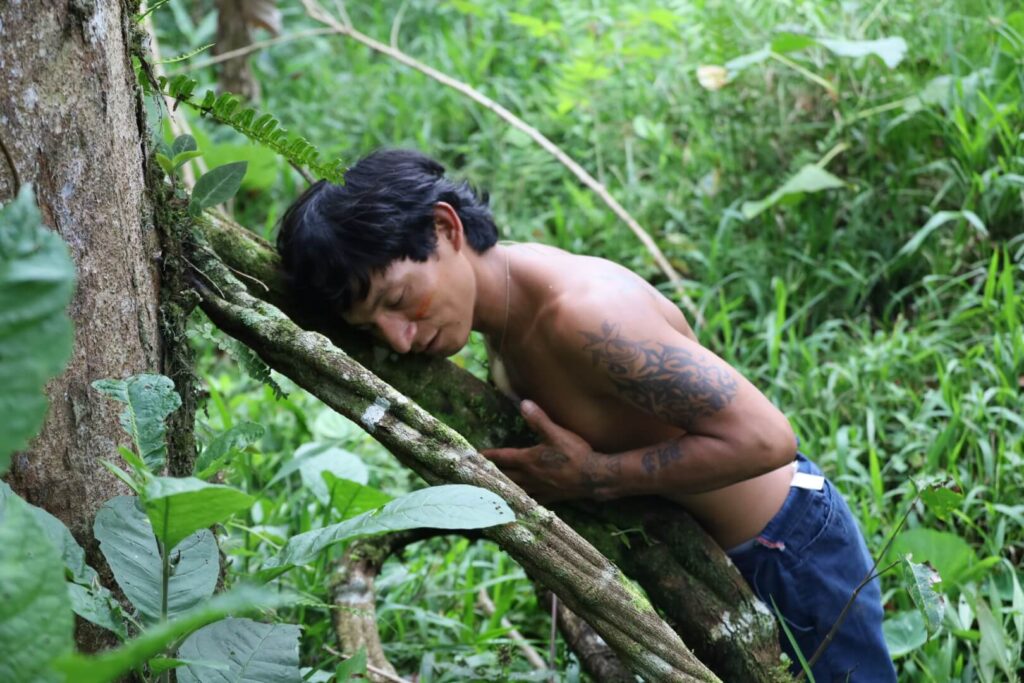
The Temple at Sacha Wasi
The Temple at Sacha Wasi is a sacred sanctuary where the Kichwa connect with their spiritual practices and traditions in a profound and meaningful way. Located in the Amazon rainforest, it is a space dedicated to connecting with the divine and accessing the wisdom and power of the spiritual realm. The temple serves as a bridge between the physical and spiritual worlds, and is a place where people can seek healing and guidance from the spirits.
Sacred plant medicine, particularly ayahuasca, is an integral part of the Temple’s practices. Ayahuasca is prepared and consumed in ceremonial settings within the temple, with a Yachak guiding participants in their spiritual journeys. Through the use of sacred plant medicine like ayahuasca, participants are able to deepen their connection with the divine and receive guidance and healing from the spiritual realm.
The Sacha Wasi Temple and its use of sacred plant medicine represent a way for individuals to address physical and emotional ailments, as well as deepen their spiritual practices. The experience of ayahuasca is seen as a powerful tool for personal growth and transformation, helping individuals connect with the natural world in a profound way.
Overall, the Sacha Wasi Temple embodies the Kitchwa culture’s deep reverence for the spiritual realm and their belief in the power of sacred plant medicine as a means of connecting with the divine and accessing its wisdom and healing. It represents a space where individuals can deepen their spiritual practices, address physical and emotional ailments, and connect with the natural world in a profound and transformative way.
The indigenous Kichwa people of Sacha Wasi have a rich spiritual tradition that is rooted in a deep connection with the natural world. The Temple embodies several key spiritual tenets that are essential to the Kichwa way of life.
Key Spiritual Tenets of the Kichwa Temple at Sacha Wasi
- Pachamama – The Earth is seen as a living being and is referred to as Pachamama. Kichwa people believe that they are part of a reciprocal relationship with the Earth and must respect and care for it in order to maintain a harmonious balance.
- Animism – Kichwa spirituality is animistic, meaning that everything in the natural world has a spirit or soul. This includes plants, animals, rocks, and even the wind and rain. Kichwa people believe that by honoring and respecting these spirits, they can establish a deeper connection with the natural world.
- Ancestral Spirits – Kichwa people believe in the existence of ancestral spirits, who guide and protect them. These spirits are honored through rituals and ceremonies and are believed to be able to provide guidance and wisdom.
- Reciprocity – Kichwa spirituality is based on the concept of reciprocity. This means that they believe that all actions have consequences and that individuals must give back to the natural world in order to receive its blessings. This can be achieved through offerings, ceremonies, and other forms of gratitude.
- Community – Kichwa spirituality emphasizes the importance of community and the interconnectedness of all beings. They believe that individuals are part of a larger web of relationships and that working together is essential for the well-being of all.
Overall, Kichwa spirituality is a deeply interconnected system that emphasizes the importance of respect, reciprocity, and community. It is a way of life that is rooted in a profound reverence for the natural world and a belief in the spiritual interconnectedness of all beings.
The Kichwa people, who are indigenous to parts of Ecuador, Peru, and Colombia, have a strong spiritual connection with nature, and view the earth as a living being with its own spirit, known as Pacha Mama.
To the Kichwa, Pacha Mama is a divine and powerful force that governs the natural world and provides life, sustenance, and abundance. They believe that everything in nature is interconnected and interdependent, and that humans must live in harmony with the environment to maintain balance and well-being.
Some Kichwa people may refer to Pacha Mama as a god or goddess, while others may view her as a grandmother spirit or a mother god, depending on their personal beliefs and experiences. The Kichwa have intimate and profound ideas about Pacha Mama. For example, they may offer gratitude and respect to Pacha Mama through ritual offerings, such as the offering of coca leaves or corn. They also see Pacha Mama as a source of healing, and may turn to her for guidance, support, and protection.
Overall, the Kichwa’s relationship with Pacha Mama is one of deep reverence, love, and gratitude, and they strive to honor and protect the natural world as an essential part of their spiritual and cultural identity.


